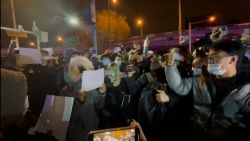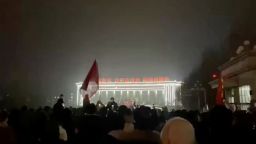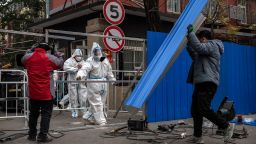China has moved quickly to suppress demonstrations that erupted across the country against the government’s zero-Covid policy on the weekend, deploying police forces at key protest sites and tightening online censorship.
On Tuesday, while defending the policy, top health officials appeared to acknowledge its impact and pledged to “reduce inconvenience” to the public by lifting lockdowns “as quickly as possible” following outbreaks.
However, it may not be enough to appease the protesters, who took to the streets of several major cities and university campuses to demand an end to the country’s increasingly costly lockdowns.
As numbers swelled, so too did the range of grievances aired, with some even calling for the removal of Chinese leader Xi Jinping, who for nearly three years has overseen a strategy of mass-testing, lockdowns, enforced quarantine and digital tracking.
Here’s what we know.
Why are Chinese people protesting?
The protests were triggered by a deadly fire last Thursday in Urumqi, the capital of the far western region of Xinjiang. The blaze killed at least 10 people and injured nine in an apartment building – leading to public fury after videos of the incident appeared to show lockdown measures had delayed firefighters from reaching the victims.
The city had been under lockdown for more than 100 days, with residents unable to leave the region and many forced to stay home.
Videos showed Urumqi residents marching to a government building and chanting for the end of lockdown on Friday. The following morning, the local government said it would lift the lockdown in stages – but did not provide a clear time frame or address the protests.
That failed to quell public anger and the protests rapidly spread beyond Xinjiang, with residents in cities and universities across China also taking to the streets.
Where are the protests happening?
So far, CNN has verified 23 demonstrations that took place across 17 Chinese cities – including the capital Beijing and financial center Shanghai.
In Shanghai on Saturday, hundreds gathered for a candlelight vigil on Urumqi Road, named after the Xinjiang city, to mourn the fire victims. Many held up blank sheets of white paper – a symbolic protest against censorship – and chanted, “Need human rights, need freedom.”
Some also shouted for Xi to “step down,” and sang The Internationale, a socialist anthemused as a call to action in demonstrations worldwide for more than a century. It was also sung during pro-democracy protests in Tiananmen Square in Beijing before a brutal crackdown by armed troops in 1989.
By Sunday evening, mass demonstrations had spread to Beijing, Chengdu, Guangzhou and Wuhan, where thousands of residents called for not only an end to Covid restrictions, but more remarkably, political freedoms. Residents in some locked-down neighborhoods tore down barriers and took to the streets.
Protests also took place on campuses, including the prestigious institutions of Peking University and Tsinghua University in Beijing, and Communication University of China, Nanjing.
In Hong Kong, where a national security law imposed by Beijing in 2020 has been used to stifle dissent, dozens of people gathered on Monday evening in the city’s Central district for a vigil. Some held blank pieces of paper, while others left flowers and held signs commemorating those killed in the Urumqi fire.

Why is this significant?
Public protest is exceedingly rare in China, where the Communist Party has tightened its grip on all aspects of life, launched a sweeping crackdown on dissent, wiped out much of civil society and built a high-tech surveillance state.
The mass surveillance system is even more stringent in Xinjiang, where the Chinese government is accused of detaining up to 2 million Uyghurs and other ethnic minorities in camps where former detainees have alleged they were physically and sexually abused.
A damning United Nations report in September described the region’s “invasive” surveillance network, with police databases containing hundreds of thousands of files with biometric data such as facial and eyeball scans.
China has repeatedly denied accusations of human rights abuses in the region.
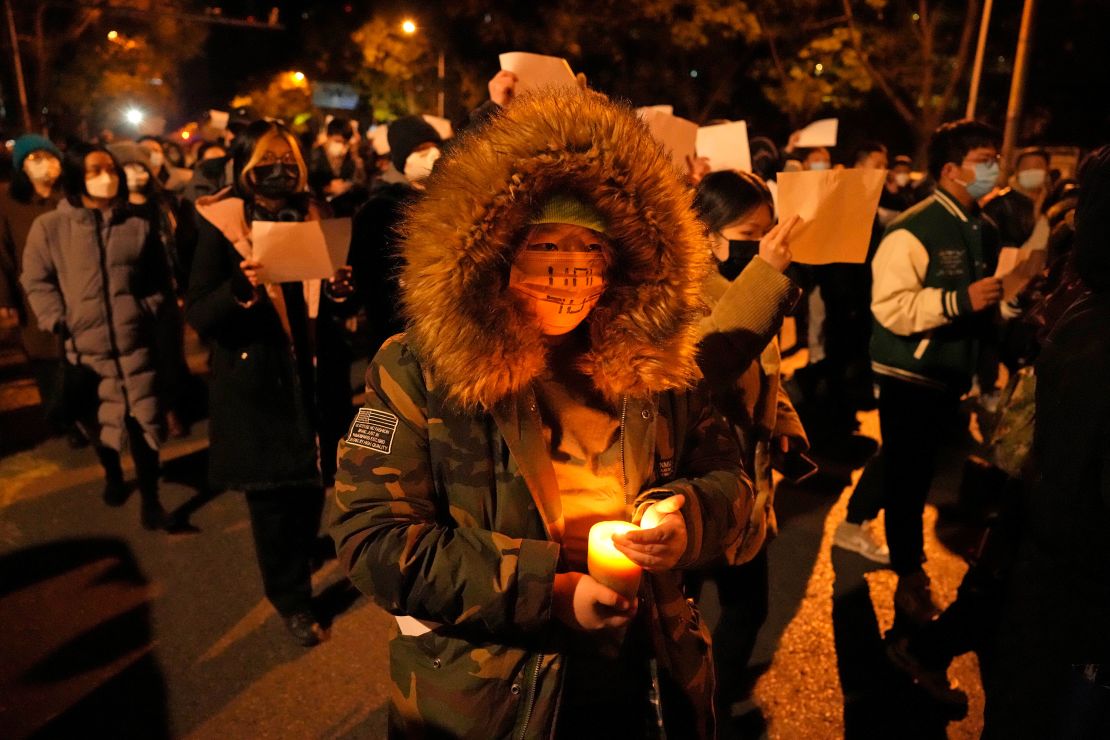
While protests do occur in China, they rarely happen on this scale, nor take such direct aim at the central government and the nation’s leader, said Maria Repnikova, an associate professor at Georgia State University who studies Chinese politics and media.
“This is a different type of protest from the more localized protests we have seen recurring over the past two decades that tend to focus their claims and demands on local officials and on very targeted societal and economic issues,” she said. Instead, this time the protests have expanded to include “the sharper expression of political grievances alongside with concerns about Covid-19 lockdowns.”
There have been growing signs in recent months that the public has run out of patience with zero-Covid, after nearly three years of economic hardship and disruption to daily life.
Isolated pockets of protest broke out October, with anti-zero-Covid slogans appearing on the walls of public bathrooms and in various Chinese cities, inspired by a banner hung by a lone protester on an overpass in Beijing just days before Xi cemented a third term in power.
Earlier in November, larger protests took place in Guangzhou, with residents defying lockdown orders to topple barriers and cheer as they took to the streets.
How have authorities responded?
While protests in several parts of China appear to have largely dispersed peacefully over the weekend, authorities responded more forcefully in some cities.
The Shanghai protests on Saturday led to scuffles between demonstrators and police, with arrests made in the early hours of the morning. Undeterred, protesters returned on Sunday, where they met a more aggressive response – videos show chaotic scenes of police pushing, dragging, and beating protesters.
The videos have since been scrubbed from the Chinese internet by censors.
One Shanghai protester told CNN he was one of around 80 to 110 people detained in the city on Saturday night. He described being transferred to a police station, having his phone confiscated and biometric information collected before being released a day later.
CNN cannot independently verify the number of those arrested.
Two foreign reporters were also briefly detained. BBC journalist Edward Lawrence was arrested in Shanghai on Sunday night, with a BBC spokesperson claiming he was “beaten and kicked by the police” while covering the protests. He has since been released.

Michael Peuker, China correspondent for Swiss public broadcaster RTS, was reporting live when he said several police officers approached him. He later posted on Twitter that the officers took him and his cameraman into a vehicle, before releasing them.
On Monday, China’s Foreign Ministry spokesman Zhao Lijian later said Lawrence had not identified himself as a journalist before being detained, and seemed to deflect questions about the protests.
When a reporter asked whether the widespread displays of public anger would make China consider ending zero-Covid, Zhao replied, “What you mentioned does not reflect what actually happened.”
On Tuesday, Zhao further defended zero-Covid, claiming Chinese citizens “enjoy various legal rights and freedoms that are fully protected by law. At the same time, any rights and freedoms should be exercised within the framework of the law.”
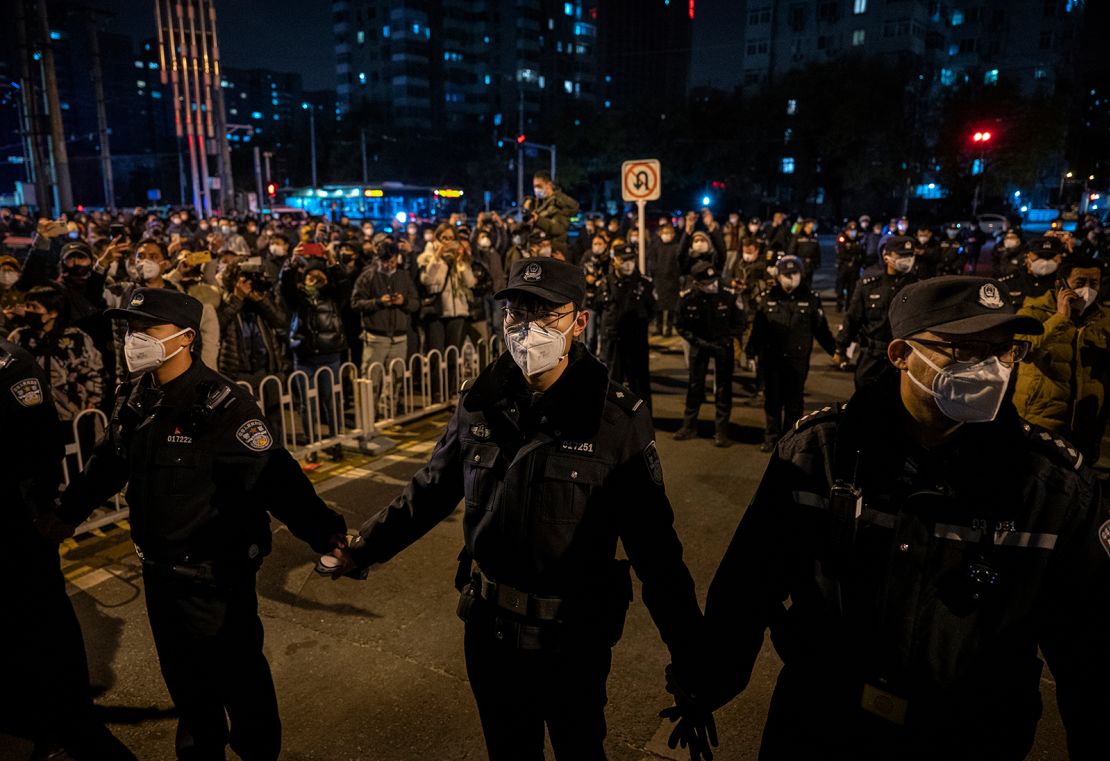
However, at State Council press briefing on Tuesday, top health officials appeared to acknowledge the disruptions caused by Covid lockdowns, saying long-term closures “can cause anxiety and life difficulties.”
Mi Feng, a spokesperson with China’s National Health Commission, said Covid policies were being rectified to include lifting lockdown “as quickly as possible” to reduce inconvenience.
Officials at the conference also announced plans to boost vaccinations for the elderly, a step experts had previously said was necessary before any potential relaxation of restrictions.
How has the world responded?
In recent days, vigils and demonstrations expressing solidarity with protesters in China have been held around the world, including in the United Kingdom, Canada, Australia, the United States and Malaysia.
Foreign government officials and organizations have also voiced support for the protesters and criticized Beijing’s response.
“We’re watching this closely, as you might expect we would,” said US National Security Council Coordinator for Strategic Communications John Kirby on Monday. “We continue to stand up and support the right of peaceful protest.”
UK Foreign Secretary James Cleverly told reporters the Chinese government should “listen to the voices of its own people … when they are saying that they are not happy with the restrictions imposed upon them.”
The European Broadcasting Union (EBU) also said on Monday that it condemned “the intolerable intimidation and aggression” directed toward member journalists in China, in an apparent reference to the foreign journalists who were detained.
CNN’s Wayne Chang, Selina Wang, Bex Wright and Ivan Watson contributed reporting.


